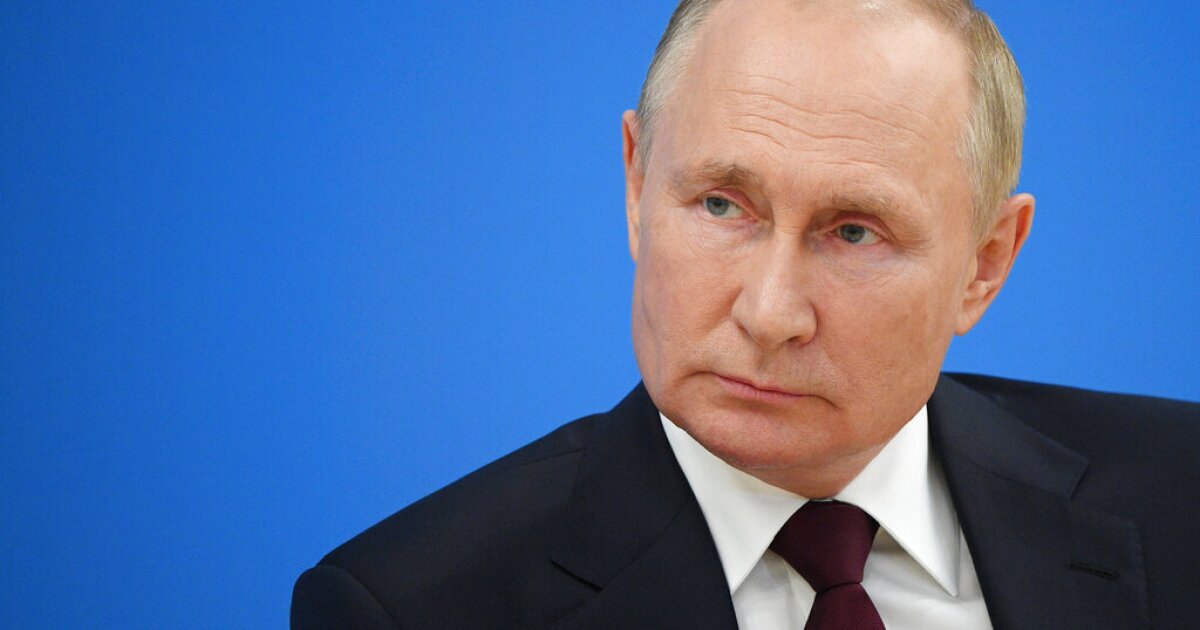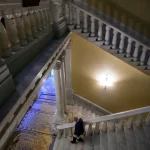

Russia has intensified a “fear campaign” to go along with blistering attacks on civilian targets in Ukraine, according to officials and analysts wary of acquiescing to Moscow’s implicit nuclear threats.
“I don’t think anyone knows for sure what they are up to, but mostly, in the big picture, it’s part of their fear campaign,” a senior European official told the Washington Examiner. “They have not been able to escalate in conventional military domain for quite some time already. Their attempts have been quite feeble, so they’ve decided to escalate in the murky domain of fear.”
Such a reliance on intimidation tactics may reflect Russian President Vladimir Putin’s background as an intelligence officer. The self-described “specialist in human relations,” confronted with mounting military and economic troubles, has overseen a barrage of allegations against Ukrainian officials while pressing the Russian bureaucracy to improve its performance.
“We are faced with the need to more rapidly resolve issues associated with providing support for the special military operation and the need to counter economic restrictions that were imposed on us, which are truly unprecedented, without any exaggeration,” Putin said Tuesday, according to a Kremlin transcript. “We need higher rates of work in all areas and the most realistic assessment of the situation, the state of affairs overall.”
BIDEN: WOULD BE A ‘VERY SERIOUS MISTAKE’ FOR RUSSIA TO USE NUCLEAR WEAPONS
Putin ordered a “partial mobilization” of Russian conscripts last month, but the draft has been marred by complaints that the Russian reserves are receiving scant training and poor equipment. More recently, Russian citizens have begun to learn of conscripts dying at the front lines within 10 days of receiving their mobilization orders.
“They’re trying to blackmail the West and to force them to give them some level of business as usual because, otherwise, it would be so difficult to support their population on the same level … they were used to,” a senior Ukrainian government adviser said. “They started that general mobilization, and I wouldn’t expect them to use any nukes in the nearest future because, again, they still have a lot of other options.”
That official acknowledged that Russia’s “dirty bomb” rhetoric is “disturbing, for sure,” but predicted that even a nuclear attack wouldn’t break the will of the Ukrainian people.
“People are not going to surrender,” the official said. “We already paid a huge price for keeping our independence, and we are not going to betray that, [the] dozens of thousands [who] have fallen just because Russians can start using something [nuclear].”
In that context, the new Russian allegation that Ukraine plans to use “a dirty bomb” in eastern Ukraine strikes some observers as a desperate attempt to “stall for time” in the face of Ukrainian counteroffensives.
“They need time now to prepare the mobilized, to bring some resources to them, to regroup a little bit, and then to find a place where they can have an assault,” said Dr. Hanna Shelest, an Odesa-based nonresident senior fellow for the Center for European Policy Analysis. “They’re trying to stall for time.”
Of course, for Western officials convinced that the Russian allegation is “absurd,” it seems clear also that Putin would expect the public accusations to be interpreted as a clue about his own plans.
“It’s a typical Russian information operation, or disinformation, or psych ops,” another senior European official who specializes in Russia policy told the Washington Examiner. “And they are desperately looking for means and new headlines to scare the West … and the more we are speculating about tactical nukes, dirty bombs, an accident, or a deliberate accident at Zaporizhzhia Nuclear Power Plant, the better for them.”
The dirty bomb fear isn’t the only allegation in circulation. Russian officials have accused Ukraine of mining a major dam in Kherson, a southern Ukrainian district that Ukrainian forces are trying to liberate from Russian occupation. And Russian diplomats have called for a United Nations Security Council meeting this week to discuss alleged “military biological programs” in Ukraine. Russian officials previously leveled this charge in March, as Ukrainian forces repelled the invading Russian military’s attempt to take Kyiv.
“They just apply the same tactic that they use to apply in other cases when they need just to confuse people,” said Shelest, the Ukrainian foreign policy expert. “So, the more [they] are bringing to the table, the less clarity of what really can be, and the more careful we should be with all the facts that we’re receiving.”
Ukrainian officials have invited United Nations nuclear watchdogs to inspect their nuclear facilities, in a bid to have an independent monitor affirm that they have no illicit military operations underway. Yet in Kyiv, the more pressing problem is Russia’s relentless bombardment of Ukraine’s energy infrastructure and other civilian targets.
“It’s completely clear that especially in the last couple of weeks, Russians made the decision to start, you know, creating a humanitarian disaster in Ukraine,” the Ukrainian official told the Washington Examiner. “At the same time, they have a lot of other ways to create that humanitarian disaster without using any nukes. So, I think that actually, they would prefer, probably, to leave that kind of option to the very end.”
Ukrainian President Volodymyr Zelensky’s government believes that Putin would hesitate to use nuclear weapons of any kind because Moscow understands that “after using nukes, they wouldn’t have any support from even countries like China and India, or neutrality,” the official said. Yet Western officials aren’t taking Putin’s restraint for granted, as the United States, the United Kingdom, and France denounced the allegations as “transparently false” in a joint statement that warned Russia not to “use this allegation as a pretext for escalation.”
“It’s our duty to keep conveying a very clear message that any use of nuclear material, any use of a nuclear device in Ukraine, or in the context of the war in Ukraine will only deteriorate their own position, both militarily and politically,” the first senior European official said. “Unless they get this message, or in case they think that they can either operationally, militarily, or politically improve their position by using a nuclear device … then they may have the temptation to actually think of that.”
If it is true that “the primary target” of the implicit dirty bomb threat “is actually the Western governments [and] societies and Western unity,” as the first senior European official put it, it’s also the case that Ukrainian officials suspect that Russia has succeeded in imposing some limits on Western aid to Ukrainian forces.
CLICK HERE TO READ MORE FROM THE WASHINGTON EXAMINER
“So that idea of limited support to Ukraine, limited sanctions to Russia — it’s not the way to deescalate the situation,” the Ukrainian official said. “This is actually the reason why they still believe they can win this war, and they believe that they can over[whelm] the West and Ukraine by different sorts of madness.”





